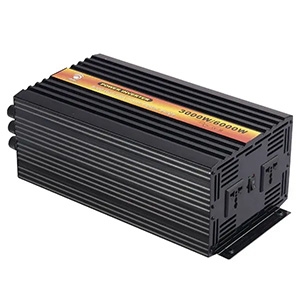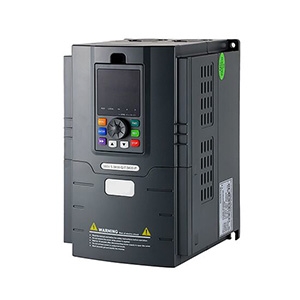In the field of power electronics and energy conversion, inverters, as key equipment for power conversion, play a vital role. Inverters are capable of converting direct current (DC) into alternating current (AC) to meet the needs of various electrical equipment and systems. Among them, power frequency inverter and high frequency inverter are two common inverter types, each with different characteristics and application scenarios. So, which one is better, a power frequency inverter or high frequency inverter? Inverter.com will conduct a detailed comparison and analysis of these two inverters from multiple perspectives to help you better understand their advantages and disadvantages and make a more informed choice.
Definition and working principle
- Power frequency inverter: Power frequency inverter usually refers to an inverter with an output frequency of 50Hz or 60Hz. Its working principle is to convert DC power into AC power with the same frequency and phase as the power grid through an internal power conversion circuit. Power frequency inverters mostly use traditional components such as transformers and inductors to convert voltage and current. Therefore, they are relatively large in size but have stable output waveforms, making them suitable for occasions with high power quality requirements.
- High frequency inverter: High frequency inverters use high-frequency switching technology to chop DC power at high frequency through high-frequency switching tubes (such as IGBT, MOSFET, etc.), and then convert high-frequency pulses into stable alternating current through high-frequency transformers and filter circuits. The output frequency of the high-frequency inverter is much higher than the power frequency, usually between a few kilohertz and tens of kilohertz. Due to the use of high-frequency switching technology, high-frequency inverters have the advantages of small size, lightweight, and high efficiency, but they also have the problem of relatively poor output waveform quality.

Performance comparison
- Volume and weight: Since high frequency inverters use high-frequency switching technology and compact circuit design, their size and weight are usually much smaller than power frequency inverters. This gives high frequency inverters significant advantages in mobile power supplies, aerospace, electric vehicles, and other fields. However, in some situations where volume and weight are not high, such as fixed power stations, data centers, etc., the size and weight of power frequency inverters will not be a problem.
- Efficiency and energy consumption: Because frequency drive inverters use high-frequency switching technology, their switching losses and iron losses are relatively small, so their efficiency is usually higher than that of power frequency inverters. In addition, high frequency inverters can maintain high efficiency under light load or no load, which is beneficial to energy saving and consumption reduction. However, under heavy load or overload conditions, the efficiency of high frequency inverters may be greatly affected. In contrast, power frequency inverters can maintain high efficiency and stability under heavy load or overload.
- Output waveform quality: The output waveform quality of power frequency inverters is usually better than that of high frequency inverters. Since the power frequency inverter uses traditional components such as transformers and inductors to transform voltage and current, its output waveform is closer to a sine wave and has lower harmonic content. Due to factors such as the nonlinear characteristics of the high-frequency switching tube and the parasitic parameters of the high-frequency transformer, the output waveform of the high frequency inverter may have certain distortion and harmonic content. Therefore, power frequency inverters have more advantages in situations with higher requirements on power quality, such as precision instruments, medical equipment, and other fields.
- Reliability and maintainability: Because variable frequency inverters use a relatively simple circuit structure and traditional components, their reliability is usually high and maintenance costs are relatively low. As high frequency inverters use new components such as high-frequency switching tubes and complex control circuits, their reliability may be affected to a certain extent, and maintenance costs are relatively high. However, with the advancement of technology and the continuous optimization of new components, the reliability and maintainability of high frequency inverters are also constantly improving.

Application scenarios
- Application scenarios of power frequency inverters: Power frequency inverters are suitable for applications that require high power quality, such as fixed power stations, data centers, precision instruments, medical equipment, and other fields. In addition, due to the large size of power frequency inverters, they are usually suitable for fixed installation or situations with large space.
- Application scenarios of high frequency inverters: High frequency inverters are more suitable for applications with high volume and weight requirements, such as mobile power supplies, aerospace, electric vehicles, and other fields. In addition, variable frequency drive inverters also have the advantages of fast response speed and good dynamic performance and are suitable for situations where power quality requirements are not particularly high.
To sum up, variable frequency inverters and high frequency inverters each have their own advantages and disadvantages and are suitable for different application scenarios. When selecting an inverter, comprehensive considerations should be made based on specific needs and scenarios. With the continuous advancement of technology and the continuous optimization of new components, the development trend of future inverters will be more efficient, compact, reliable, and intelligent. We look forward to more innovations and breakthroughs in inverter technology in the future, which will bring more development opportunities and challenges to the fields of energy conversion and power electronics.
Inverter.com offers universal frequency inverters, single phase input and output frequency inverters, single phase to three phase frequency inverters, and three phase frequency inverters which are widely used in various loads. Welcome to purchase.
